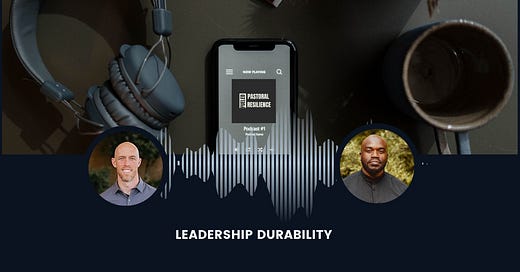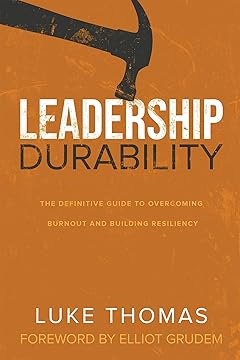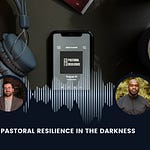Luke Thomas currently leads Legacy Church in Knoxville TN, a church he planted in 2010. Enjoying a call to start new works, his family has been a part of planting churches and campus ministries in Texas, Florida, and Tennessee for the past 20+ years. Beyond his education in biology, chemistry, human physiology (B.S. Biology, University of Texas Permian Basin) coaching, and athletic training, his deepest experience in leadership health was completely burning out himself in 2011. Too sick to lead, he began experimenting on his own broken health. It’s from this journey that he researched and interviewed today's best voices in stress science from a wide variety of disciplines. Upon finding his own leadership health, Luke began conference speaking and coaching leaders in leadership self-care. For fun, Luke competes in endurance racing ranging from ultramarathons to Ironman triathlon and sits in a hammock as long as possible whenever possible.
Find out more about Luke at : https://www.peoplelaunching.com/
Buy his book Leadership Durability here: Leadership Durability Book
Summary Of Conversation
In this conversation, Dr. Raphael Mnkandhla and Pastor Luke Thomas delve into the critical topic of resilience in ministry, exploring the challenges of burnout and the importance of self-care for pastors. Luke shares his personal journey of overcoming severe burnout and the strategies he developed to promote leadership durability. They discuss foundational habits for self-care, recognizing signs of leadership sickness, and the theological assumptions that often lead pastors to neglect their well-being. The conversation emphasizes the necessity of taking sabbaticals and the importance of accountability in maintaining a healthy ministry life.
Based on the document, here are key insights, quotes, and key takeaways from the podcast interview with Pastor Luke Thomas on pastoral resilience and preventing burnout:
Key Insights:
Burnout is often unseen and can be catastrophic. Thomas's personal experience highlights that feeling "fine" doesn't always equate to being healthy, and burnout can manifest suddenly and severely.
Proactive self-care is crucial, even when thriving. Relying on subjective feelings of well-being can be misleading; objective data (like from wearables) and strategic self-care protocols are vital to prevent gradual degradation.
Burnout stems from both physical and theological factors. While physical well-being (sleep, diet, rest) is foundational, underlying "gospel fractures" or faulty theological assumptions (e.g., needing to build the church alone, rest being a sign of weakness) are significant drivers of burnout.
Accountability is non-negotiable for long-term health. A robust support system (spouse, elders, coaches, counselors) is essential to provide perspective, challenge unhealthy patterns, and ensure honest self-assessment.
Sabbaticals are a "nuclear option" for severe burnout, but require guidance. A sabbatical is presented as a necessary and radical remedy for deep burnout, but its effectiveness is significantly enhanced by professional guidance to ensure true rest and processing, rather than just a prolonged vacation.
The landscape of self-care is evolving rapidly. Advancements in technology (wearables, blood tests) and understanding of functional fitness offer new tools and approaches for monitoring and improving pastoral health.
Key Quotes:
"There's a difference between being fit and being healthy. And I confused the two. And when I said I felt fine, I really didn't have any scope or perspective for what fine really was." (9:42)
"If the Lord does not build his house, that means I must do it. And if I have to do it, I might not always be able to wait on the Lord to do it." (29:28)
"No one gets an award for resting well. No one gets awards for building slowly. No one headlines a conference because they were really good at resting. That doesn't happen." (29:50)
"The real thing that keeps me from burnout is not the whoop. It's not my sleep schedule or how I do a calendar. It's understanding, That I am leading in a church that is built by a sovereign God." (33:53)
"Perspective is what we lose. If you don't take time to make sense of all of the hits you're taking, you don't have time to make sense of all of the energy you were spending." (36:51)
"There is nothing to prove and there is no one to impress. That being a common chorus over your life. The fact that Jesus is building your church for you, that's the best thing you've got going for you." (1:02:59)
Key Takeaways:
Prioritize objective self-assessment: Don't solely rely on how you feel; use data (like from wearable devices or blood tests) to understand your true physiological state.
Establish non-negotiable self-care foundations: Sleep, diet, and strategic work-rest rhythms are fundamental for sustained pastoral health.
Challenge unhealthy theological assumptions: Actively combat beliefs that promote overwork, self-sufficiency, or a disdain for rest, and embrace a theology that celebrates human limitations and God's sovereignty in building His church.
Cultivate a diverse and honest accountability network: Don't let your spouse bear the entire burden; involve elders, coaches, and counselors who can provide objective insight and challenge you when necessary.
Embrace varied forms of rest: Implement micro-rests throughout the day, regular longer breaks, and structured sabbaticals commensurate with the demands of ministry.
Seek professional guidance for severe burnout: A sabbatical without expert support may not lead to true recovery. Invest in coaching or counseling to process and rebuild effectively.
Integrate self-care principles into ministry culture: Train up-and-coming ministers and high-performing church members on the importance of holistic health, recognizing that burnout is a risk across demanding professions.1
Reflection Questions:
How do I objectively assess my well-being, beyond just how I "feel" day-to-day?
What proactive strategies am I currently employing to ensure long-term leadership durability, even in good seasons?
What are my personal "rumble strips" or early warning signs of stress and fatigue (e.g., anxiety, over/under-reacting, frequent sickness, stomach pain, loss of creativity)?
Are there any specific "gospel fractures" or unhealthy theological assumptions that are leading me to ignore these warning signs (e.g., "sleep is for the weak," "I must build the church myself")?
Who are the key people in my life (spouse, elders, coaches, counselors) who can provide honest, objective feedback and accountability regarding my health, and am I actively inviting them into that space?
To what extent am I truly acknowledging the severity of my current state, and am I open to radical remedies like a sabbatical?
What does it look like to "rest to the glory of God" in my specific context and ministry?
Would you like me to provide more questions or elaborate on any of these?
Notes generated from the transcript by Gemini














Share this post